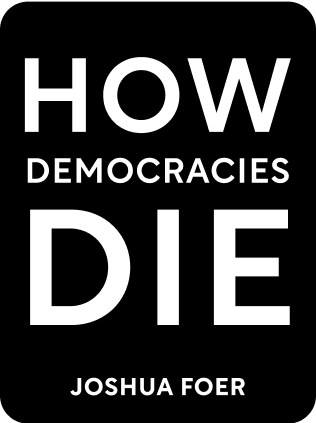

This article is an excerpt from the Shortform book guide to "How Democracies Die" by Steven Levitsky and Daniel Ziblatt. Shortform has the world's best summaries and analyses of books you should be reading.
Like this article? Sign up for a free trial here .
Can American democracy be salvaged? What can be done to save the country from democratic decay?
According to Levitsky and Ziblatt, the authors of How Democracies Die, democracy is a shared enterprise in which all participate together. The key to preserving democracy, they argue, is to transcend the partisan divide. To this end, they propose some reforms that can help rescue and strengthen it.
In this article, we’ll discuss what can be done to save democracy in America, according to Levitsky and Ziblatt.
Saving American Democracy
Levitsky and Ziblatt argue that pro-democratic forces must overcome America’s deep structural divisions if they are to preserve democracy. They advocate the forging of broad, pro-democratic coalitions that cut across racial, ethnic, religious, and socioeconomic lines. By their very nature and composition, they can appeal to a broader slice of the country and transcend the partisan divide. This can lead to depolarization, which in turn, strengthens democratic norms of mutual toleration and institutional forbearance.
| Working Toward Depolarization Some research suggests that the depolarization envisioned by Levitsky and Ziblatt is indeed possible. Stanford scholars James Fishkin and Larry Diamond have seen some positive results with a technique called Deliberative Democracy. Through Deliberative Democracy, people from different backgrounds come together as “citizen delegates” to participate in a discussion about contentious political issues, consider the merits of opposing arguments, and try to consciously set aside their partisan labels. In 2020, Fishkin and Diamond conducted an experiment called “America in One Room,” in which they brought together a representative sample of 500 Americans to discuss a range of hot-button issues from healthcare reform to global warming to immigration. Through moderated, small-group discussions, the researchers found that participants developed increased empathy for their opponents and gained a better understanding of how policy proposals would affect them. The exercise seemed to deliver real results. At the beginning of the experiment, researchers found sharp divisions between partisans on all 26 issues under discussion. But after building mutual empathy and understanding, they were able to find significant common ground on 19 of the 26 issues. Currently, Fishkin and Diamond are working on a digital engagement tool that would enable them to implement Deliberative Democracy on a nationwide scale. |
What Republicans Can Do
Levitsky and Ziblatt recommend that the GOP moderate its hardline right-wing social and economic ideology and abandon what they see as its appeals to white nationalism. They believe these moves will help the party broaden its appeal to a more diverse cross-section of the electorate. Only when it becomes a big-tent party that straddles religious and ethnic lines, say Levitsky and Ziblatt, can the Republican Party resume its function as the center-right tentpole of American democracy.
| GOP 2020 Gains With Minority Voters Although Levitsky and Ziblatt decry what they see as the drift of the GOP toward white ethnonationalist politics, the Republican Party gained support among Black and Latino voters in the 2020 elections over previous cycles. According to exit polls, Trump gained four percentage points with African Americans, three with Hispanics and Latinos, and five with Asian Americans when we compare his 2016 performance with his 2020 performance. And it had a real impact. Analysis of these results shows that Trump’s improved standing with these voters helped Republicans win close races in Texas, Florida, and North Carolina. This suggests that, contrary to what the authors say, Republicans may already have a path to broadening their coalition without significantly altering their policy agenda. |
What Democrats Can Do
Levitsky and Ziblatt call on the Democratic Party to use its position as the nation’s center-left party to ameliorate what they see as one of the main drivers of extreme polarization—widening income inequality. They argue Democrats should embrace universal benefits like childcare, healthcare, and even a universal basic income. Because everyone benefits from this version of the welfare state, it can be supported by a broader political coalition—one that cuts across racial, cultural, and socioeconomic lines.
| The Pitfalls of Universal Basic Income Closely tied to Levitsky and Ziblatt’s proposal to replace targeted, means-tested programs with universal benefits is an idea that has gained steam over the last few years—universal basic income (UBI). In 2020, Democratic presidential candidate Andrew Yang made it his signature issue, and it’s attracted more and more adherents, on both sides of the aisle. The most radical version of UBI would replace all existing public benefits (such as unemployment, veteran’s benefits, Medicare, Medicaid, Social Security) as well as tax benefits (like standard deductions, personal exemptions, and child and family allowances) with a regular, universal cash payment for everyone. Unfortunately, contrary to Levitsky and Ziblatt’s hopes for a more universal benefit system, studies show that replacing the existing means-tested welfare state with UBI would actually increase the number of people living in poverty. This would be especially true for people over 65—especially the poorest seniors, who already receive far more from benefits like Social Security and Medicare than they would from UBI. |
Democracy: A Shared Enterprise
Ultimately, Levitsky and Ziblatt argue that it will take committed citizens, not a single political leader or party, to save democracy in the United States. Democracy is a team sport in which all participate together. Society can make the collective choice to destroy democracy—or enable it to thrive in a new, multiracial, multicultural society.
| The Fate of Multiracial Democracy in India The challenges of building sustaining a true democracy in a diverse society are by no means unique to the U.S. In India, one can also see the ethnocultural majority group resorting to increasingly anti-democratic tactics to stave off what it sees as impending numerical domination by minorities. For example, since taking office in 2014, Prime Minister Narendra Modi has cracked down on the free press, intimidated members of the judiciary who dare to investigate him and his allies, and made moves to transform India into an authoritarian Hindu nationalist state. |

———End of Preview———
Like what you just read? Read the rest of the world's best book summary and analysis of Steven Levitsky and Daniel Ziblatt's "How Democracies Die" at Shortform .
Here's what you'll find in our full How Democracies Die summary :
- How shared norms are essential for preserving democracy
- Why the Trump presidency threatened those shared norms
- Why democracy goes beyond individual leaders and parties and must be a shared enterprise among committed individuals






